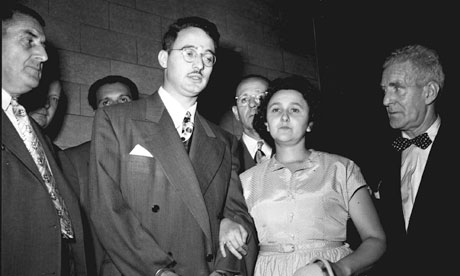Sixty years ago today, Ethel and Julius Rosenberg were legally murdered by the United States government. Today, their children see that horror as a force for good …
Today, the US government asserts that danger from the international terrorist conspiracy and their weapons of mass destruction justifies massive surveillance, indefinite detention and even torture. Authorities say we must guard national secrets even more securely to avoid destruction. Today, the issues raised by the Rosenberg case resonate from the Oval Office of the White House to Bradley Manning, who is being tried under the Espionage Act of 1917, as were Ethel and Julius.
Out of the horror of the Rosenbergs’ executions, a force for good
Our relatives’ trial for espionage marked a nadir of cold war paranoia. Now, 60 years on, we have our ‘constructive revenge’
Robert Meeropol and Jenn Meeropol
Julius and Ethel Rosenberg during their trial for espionage in New York in 1951. The couple were executed in 1953 after being found guilty of spying for the Soviet Union. Photograph: AP
We are Robert and Jenn Meeropol, son and granddaughter of Ethel and Julius Rosenberg. We are acutely aware of the political lessons to be drawn from the conviction and execution of the Rosenbergs at the height of the McCarthy period. The charge was conspiracy to commit espionage, but our family members were presented as traitors who gave the Soviet Union the secret of the atomic bomb.
The US government used the Rosenberg case to attempt to prove to the public that the international communist conspiracy threatened the American way of life, and claimed fighting communism required that human rights and civil liberties take a back seat to national security.
Today, the US government asserts that danger from the international terrorist conspiracy and their weapons of mass destruction justifies massive surveillance, indefinite detention and even torture. Authorities say we must guard national secrets even more securely to avoid destruction. Today, the issues raised by the Rosenberg case resonate from the Oval Office of the White House to Bradley Manning, who is being tried under the Espionage Act of 1917, as were Ethel and Julius.
But there are other, more personal, lessons to draw as well.
From the ages of three to seven, I, Robert, lived a nightmare. After my parents’ arrest, relatives were too frightened to take my brother Michael and me into their homes, so we were dumped in a shelter. After the executions, we were thrown out of the New Jersey state school system when local residents found out about our parentage.
In 1954, in a politically motivated attempt to separate us from Rosenberg supporters, Michael and I were seized by New York City police from the home of our prospective adoptive parents and placed in an orphanage. But Abel and Anne Meeropol won the ensuing custody battle, our last name was changed to theirs, and we dropped from public sight for almost two decades. During those growing-up years, I dreamed of revenge.
I, Jenn, was two years old when my father and uncle decided to reclaim their heritage by mounting a public campaign to force the US government to release secret files relating to the Rosenbergs case. My dad worried that his actions might expose me to trauma and fear, similarly to his childhood experience. I was safe in my family but profoundly aware of what had happened to my grandparents. I grew up with sadness and anger about what was done to Ethel and Julius, as well as a fierce pride in who they were and what they stood for.
As I entered college in 1990, my father started the Rosenberg Fund for Children (RFC), a public foundation to help children who are experiencing similar nightmares to what he lived through as a child. The RFC is a way to transform the destruction placed on his family into a positive force to benefit a new generation of families, the way a community of support rallied to aid him and his brother after their parents were killed.
As a young adult, I watched the RFC help hundreds of children who grew up with political targeting in their families. I realized that they probably endured a similar stew of emotions – sorrow and anger, pride and obligation – to my dad’s, and my own. Growing up, I also dreamed of getting retribution from the forces that killed my grandparents before I could know them.
I joined the RFC’s staff in 2007 as granting coordinator. Now, during this 60th anniversary year of my grandparents’ execution, my father will retire as executive director and I will take over the helm of the organization he founded.
We both think of the RFC as our revenge – our constructive revenge. When bad things happen to people, to families and communities, it is natural to want to strike back, to settle the score. The wish to avoid being a passive victim is healthy, but revenge itself is usually destructive. For us, harnessing our desire to strike back and focusing it on creating a positive response is personally satisfying, and our contribution to making a positive difference in the world.


Oy!